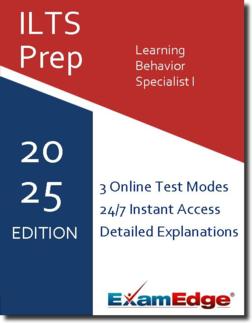ILTS Learning Behavior Specialist I (290) Practice Tests & Test Prep by Exam Edge - Topics
Based on 22 Reviews
- Real Exam Simulation: Timed questions and matching content build comfort for your ILTS Learning Behavior Specialist I test day.
- Instant, 24/7 Access: Web-based ILTS Learning Behavior Specialist I practice exams with no software needed.
- Clear Explanations: Step-by-step answers and explanations for your ILTS exam to strengthen understanding.
- Boosted Confidence: Reduces anxiety and improves test-taking skills to ace your ILTS Learning Behavior Specialist I (290).

Understanding the exact breakdown of the ILTS Learning Behavior Specialist I test will help you know what to expect and how to most effectively prepare. The ILTS Learning Behavior Specialist I has 100 multiple-choice questions The exam will be broken down into the sections below:
| ILTS Learning Behavior Specialist I Exam Blueprint | ||
|---|---|---|
| Domain Name | % | Number of Questions |
| Understanding Students with Disabilities | 16% | 16 |
| Assessing Students and Developing Individualized Programs | 23% | 23 |
| Supporting Development and Learning | 31% | 31 |
| Working in a Collaborative Learning Community | 15% | 15 |
| Foundations and Professional Practice | 15% | 15 |


